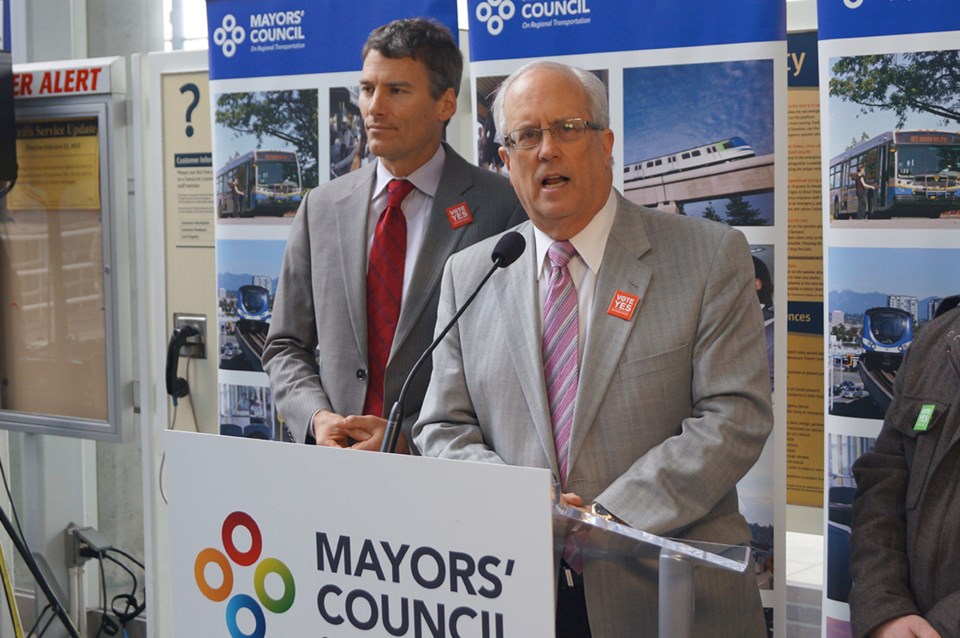Mayor Malcolm Brodie was joined by his Vancouver counterpart Mayor Gregor Robertson at Brighouse station in Richmond Wednesday morning to stake claims that a 'Yes' vote in the upcoming transit tax plebiscite will improve the economy as well as the environment and, notably, the money raised will be at arms-length of TransLink's base budget.
They said congestion in the region costs the economy $1 billion annually when factoring in fuel costs and time lost sitting in traffic, citing a study paid for by the Mayors' Council and conducted by InterVistas Consulting.
Brodie and Robertson are part of the Mayor's Council, a group of Metro Vancouver mayors that is asking for a 0.5 per cent regional sales tax that should initially raise about $250 million each year for new transit infrastructure improvements.
On March 16 Metro residents will be mailed a ballot. One can mark down either 'Yes' to agree to the tax, or 'No' to prevent its implementation.
One of the perceived problems for the mayors is the public perception of TransLink, the region's transportation authority, which has been plagued by perceived unilateral decison making, overspending on executives and project cost overruns, such as the delayed fare gates and transit card system (Compass).
While the new tax funds will go to infrastructure managed by TransLink, Brodie said the money will be audited annually at arms length.
"It's absolutely critical to have a group that will monitor the money. …That's what gives me confidence," said Brodie, who called for a change in TransLink's governance model (Brodie has stated the mayors need more control over regional transportation).
The mayors noted there are no plans to either increase or decrease the tax at a later date, but both options are theoretically possible.
Infrastructure projects funded by the new tax include a Broadway subway in Vancouver, light rail transit in Surrey, a replacement Pattullo Bridge in New Westminster and 11 new B-Line rapid bus routes in the region.
While TransLink handles existing ridership with its current base budget, Brodie said the new projects, funded by the tax, are required to keep pace with growing transportation demands as the region's population grows.
With the tax the council claims bus service hours will grow two per cent annually. Without it, and any other additional funding, hours would only increase 10 per cent in total by 2045.
The council also claims the projects will create 7,000 jobs by 2030.
Unifor's regional director Gavin McGarrigle said many trade unions are also backing the 'Yes' side.
Speaking at the event, McGarrigle called the 'No' proponents "cynical."
When asked if the projects are guaranteed Brodie said that they were "priorities."
According to the website mayorscouncil.ca the priorities in Richmond "over the next decade" are: Twenty additional train cars and extended platforms for the Canada Line and a new Richmond to Metrotown B-Line bus.
The mayors' plan also includes priorities such as 50 per cent more SeaBus service, 80 per cent more night bus service, 30 per cent more HandyDart service, Expo Line upgrades, more frequent peak-hour service and 300 more kilometres of bike lanes.
The council claims that implementing the tax will have a $450 million impact on the economy.
"We need to help people, goods and services to move more easily throughout the Metro Vancouver region. Implementing transportation and road improvements will help us avoid traffic and economic gridlock as we enhance the environment," said Brodie.
Brodie said the Canada Line is a "great example of how we've improved the livability and accessibility not just for Richmond but throughout the region."
Ridership stands at 120,000 trips each weekday, said Brodie.
In 2005 TransLink and Richmond City Council approved the Canada Line with single tracking to Brighouse terminal station as well as shorter platforms, to save money. Those decisions have limited capacity for ridership, which has exceeded expectations since its opening in 2009.
Read the economic report sponsored by the Mayors' Council here.



